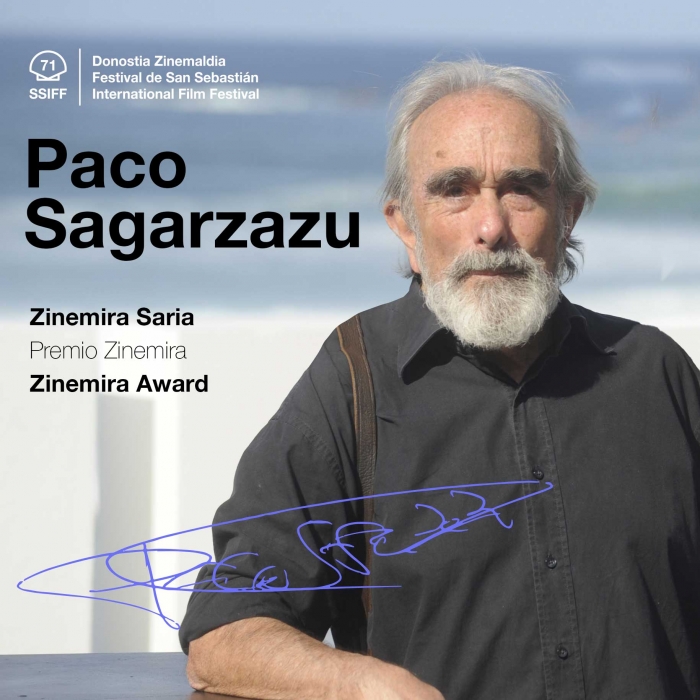The Zinemira Award, to be presented at the Basque Cinema Gala, is the honorary award given by the San Sebastian Festival and the EPE/APV and IBAIA producers associations to the career of an outstanding figure, programme or institution in the world of Basque cinema. Until now, it has recognised the careers of Imanol Uribe (2009), Álex Angulo (2010), Elías Querejeta (2011), Michel Gaztambide (2012), Juanba Berasategi (2013), Pedro Olea (2014), Karmele Soler (2015), Ramón Barea (2016), Julia Juaniz (2017), Ramón Agirre (2018), Jose María Txepe Lara (2019), Sara Bilbatua (2020), the Kimuak programme (2021) and Txema Areizaga (2022). This year the Festival and the producers associations have decided to pay tribute to the actor Paco Sagarzazu, an indispensable figure on Basque screens and stages in the last 40 years.
Paco Sagarzazu (San Sebastian, 1940) had his first experience with the cinema when his theatre play Balantzatxoa was taken to the screen in 1976 by director Juanmi Gutiérrez and became the first movie for children to be shot in the Basque language. The following year he won the Ciudad de Irun Prize with his novel Para no sé quién. While working for Radio Popular as a presenter, writer and scriptwriter of comedy programmes, he went along to the casting for La fuga de Segovia (Imanol Uribe, 1981) where he was chosen to play the part of one of the prisoners.
Since then, his name has been linked to Basque cinema as a luxury member of the cast in projects by moviemakers such as Montxo Armendáriz (Tasio, Official Selection, 1984), Eloy de la Iglesia (Otra vuelta de tuerca, Official Selection, 1985), Ana Díez (Ander eta Yul, New Directors, 1988), Daniel Calparsoro (Salto al vacío / Jump into the Void, Made in Spain, 1995), Antonio Mercero (La hora de los valientes, Made in Spain, 1998), Gracia Querejeta (Cuando vuelvas a mi lado / By My Side Again, Official Selection 1999), Juanma Bajo Ulloa (Año mariano, 2000), Javier Fesser (La gran aventura de Mortadelo y Filemón, Made in Spain, 2003), Asier Altuna and Telmo Esnal (Aupa Etxebeste!, New Directors, 2005), Álex de la Iglesia (Balada triste de trompeta / The Last Circus, Made in Spain, 2010) and Aritz Moreno (Ventajas de viajar en tren / Advantages of Travelling by Train, 2019).
For decades, Sagarzazu has been a regular face in countless Basque short film projects, such as Alsasua 1936 (Helena Taberna, 1994), Muerto de amor (Ramón Barea and José María Lara, 1997), Txotx (Asier Altuna and Telmo Esnal, 1997), Cotton Candy (Aritz Moreno, 2009), Él nunca lo haría (Anartz Zuazua, 2009), Artalde (Asier Altuna, 2010) and Cólera (Aritz Moreno, 2013), among many others. He has also worked in TV series including El comisario, Policías, Hospital Central and Cuéntame cómo pasó, and has an important career in theatre, where he has starred, among other functions, in El florido pensil, El hombre que confundió a su mujer con un sombrero, Las sillas, Las criadas and Cabaret latino.





